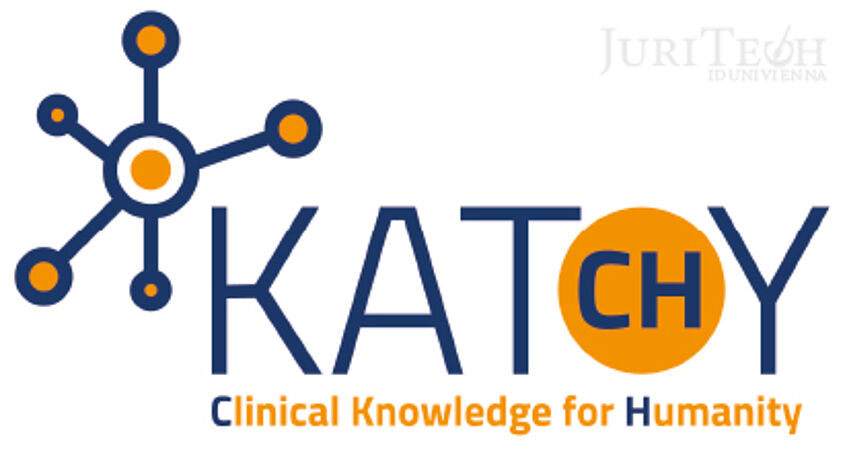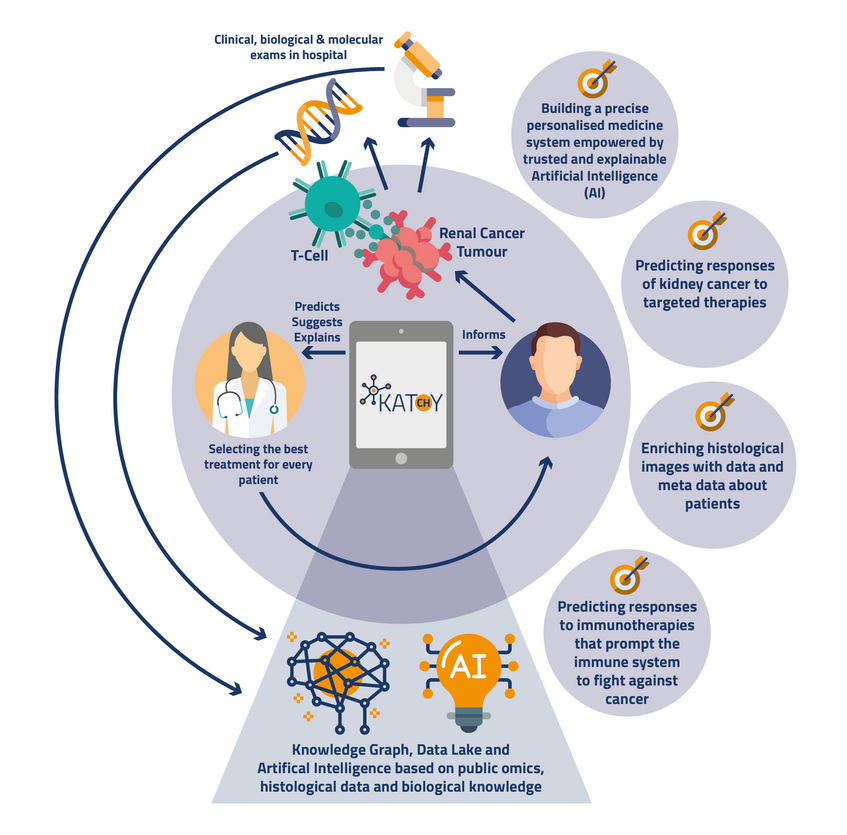The KATY Project

by Katarzyna Barud
Cancer is a critical health issue across nations and poses a burden on people around the world. Kidney cancer is one of the 10 most common cancers in both men and women, and the number of new kidney cancer cases has been rising since the 1990s[1] and levelled off in the last few years.
The KATY project, an EU-funded Horizon 2020 research project (Grant Agreement No. 101017453), addresses the EU mission area Cancer and tackles one of these biggest societal challenges. The main objective is to help more people live without cancer and ensure, in particular, that more cancer patients are diagnosed early, suffer less and have a better quality of life after treatment.
In KATY – full name: Knowledge At the Tip of Your fingers: Clinical Knowledge for Humanity – we aim to build a precise personalised medicine system empowered by Artificial Intelligence solutions, which predicts the response of kidney cancer – particularly renal cancer – to targeted therapies. The system should bring medical, AI-empowered knowledge to the tips of the fingers of clinicians and clinical researchers.
What is AI-empowered knowledge? It is knowledge interpretable by humans, structured by machine learning algorithms, which the mentioned parties can understand, trust and effectively use in their everyday working routine.
The system is developed around two main components: a Distributed Knowledge Graph and a pool of eXplainable AI predictors (XAIP), based on omics, histological and clinical data and biological knowledge. Both components, available on the KATY Platform – a final result of the project – will allow clinicians not only to receive a suggestion of the best treatment method but will also provide them with an explanation of why a particular method has been selected.
The main objectives of the project are:
- Linking genomics repositories securely across the EU in a Distributed Knowledge Graph
- Demonstrating the potential and benefits of eXplainable AI technologies by applying them to Europe’s relevant genomic repositories in personalised medicine
- Providing a predictive system to clinicians for AI-based treatment recommendations to support them in their process of selecting the treatment best suited to each patient
- Setting up a proof-of-concept application of AI models and knowledge graphs in the context of a clinical pilot in renal cancer
- Reducing the burden of disease for renal cancer patients by applying existing treatments in a more targeted way
- Cataloguing the set of biological, molecular and clinical public knowledge needed to organise data relating to patients treated with targeted therapy by applying cutting-edge computational infrastructures
- Enhancing the overall diagnostic capacity for complex diseases by using AI-based models to predict patient response to targeted therapies and the identification of molecular evidence to support these predictions.
The graphical image below shows how the KATY platform, powered by data knowledge graphs and artificial intelligence models, can support these goals and improve doctor-patient communication.

The project involves 20 partners from 11 countries, including academic partners, research institutes and small and medium-sized enterprises (SMEs), all cooperating under the coordination of the University of Rome Tor Vergata. The following experts are working towards making the vision a reality: clinicians, bioinformaticians, computer infrastructure experts, data science and artificial intelligence expert, security experts, researchers for experimental validation of predictions, front-end developers and legal and ethical experts.
We, the Department of Innovation and Digitalisation, act in the project as a legal and ethical consultant, providing expertise in data protection, data governance and data management from the legal perspective. A project such as KATY operates with large amounts of data, among them also data considered as special categories of data, i.e., data concerning health and genetic data. Processing of those types of data is strictly regulated by the General Data Protection Regulation, as well as national data protection laws. It is of high importance for the project to comply with the requirements posed by this legal framework. We support all partners by responding to those requirements to enable the appropriate development of the project and contribution to innovation in the scientific world concerning the rights and freedoms of individuals, whose data are processed. The KATY project will run until December 2024 and has several sister projects.
Further information on the KATY project can be found on the project website and Twitter.
